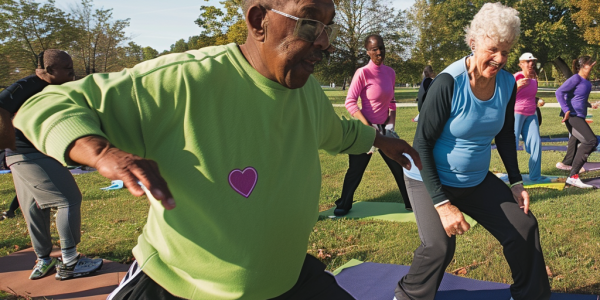Alarming Study Reveals Low Physical Activity Levels in Young Children
A new study reveals alarming trends in children’s health, showing only 14% of children aged three to four meet WHO guidelines for physical activity, sleep, and screen time. Conducted by researchers from the University of Wollongong and the University of Stirling, the study analyzed data from over 7,000 children across 33 countries. It highlights the urgent need for parents, educators, and policymakers to promote healthier lifestyles and address disparities in children’s activity levels globally.
Can a 150-Second Workout Really Transform Your Fitness?
Discover the effectiveness of the new 150-second workout trend that’s taking the fitness world by storm. This quick, high-intensity routine promises to help you achieve your fitness goals in just two and a half minutes. Experts discuss its role in a balanced fitness strategy, emphasizing the importance of combining active exercises with walking for long-term health benefits.
Jacob Meyer Joins UW–Madison as New Kinesiology Professor
The University of Wisconsin–Madison welcomes Jacob Meyer as an Assistant Professor in Kinesiology, specializing in exercise psychology. With a strong academic background and a focus on behavioral interventions for mental health, Meyer aims to enhance understanding of exercise’s impact on mood and well-being. His return to UW–Madison marks a significant addition to the faculty, promising innovative research and community engagement.
Iowa Officials Urge Lifestyle Changes to Combat Heart Disease Crisis
As heart disease remains the leading cause of death in Iowa, health officials stress the importance of lifestyle changes to combat this growing issue. With over 7,000 lives lost annually, experts like McKenna Schmidt encourage Iowans to adopt healthier habits, cease smoking, and engage in regular exercise. Despite access to healthcare, many neglect annual check-ups, risking a future where over 60% of adults may face heart disease by 2050. Prioritizing heart health is essential for Iowans to ensure a healthier future.
Light Physical Activity Improves Chances of Healthy Aging, Study Finds
New research suggests that light physical activity, like housework, can boost healthy aging. A study of 45,176 participants found that 2 hours of TV daily decreased healthy aging odds by 12%, while 2 hours of light activity increased them by 6%. Researchers stress the importance of combating sedentary behaviors for overall health.
The Joy of Movement: How Exercise Can Boost Happiness and Mental Well-Being
Discover the powerful connection between movement and happiness with psychologist Kelly McGonigal. Learn how exercise triggers the release of ‘hope’ molecules that can positively impact mood and mental health. Embrace physical activity as a tool for self-care and empowerment to boost your overall well-being.
Global Rise in Insufficient Physical Activity Among Adults
A recent study reveals that insufficient physical activity among adults has been increasing globally from 2000 to 2022, with a prevalence of 31.3% in 2022. This trend poses risks for various health issues, highlighting the importance of promoting physical activity to improve overall health and well-being.
The Importance of Physical Activity for Mental Wellness
Learn about the importance of physical activity for mental wellness during Mental Health Month. Discover how the McDowell Wellness Center in Danville promotes the connection between exercise and mental well-being, emphasizing the role of endorphins in boosting feel-good chemicals in the brain. Find out how engaging in activities can lead to improved sleep, confidence, and overall well-being, and why maintaining a healthy level of physical activity is crucial for brain health as individuals age.
Building a Lifelong Exercise Habit: Key Strategies for Success
Discover the importance of exercise as a lifelong habit for overall well-being. Learn how regular physical activity can reduce the risk of chronic diseases, manage stress, and enhance mood and cognitive function. Experts offer tips on overcoming barriers to exercise, such as busy schedules and lack of motivation, by setting achievable goals and finding enjoyable activities. Find out how social support can help you maintain a consistent workout routine for long-term health benefits.
The Link Between Exercise, Muscle Function, and Brain Health
Discover the significant link between exercise, muscle function, and brain health in a recent study. Learn how neurons influence muscle secretions, the impact of glutamate on muscle activation, and the implications for aging and neuromuscular health. Find out how exercise-induced muscle secretions enhance brain function and the importance of maintaining the brain-nerve-muscle loop for overall well-being.










